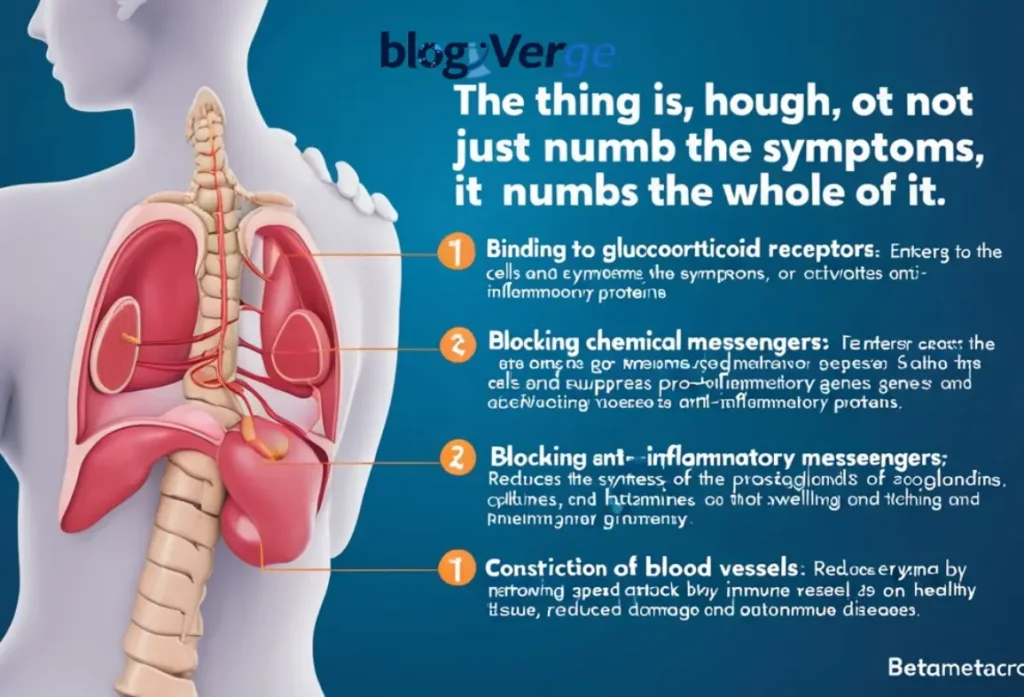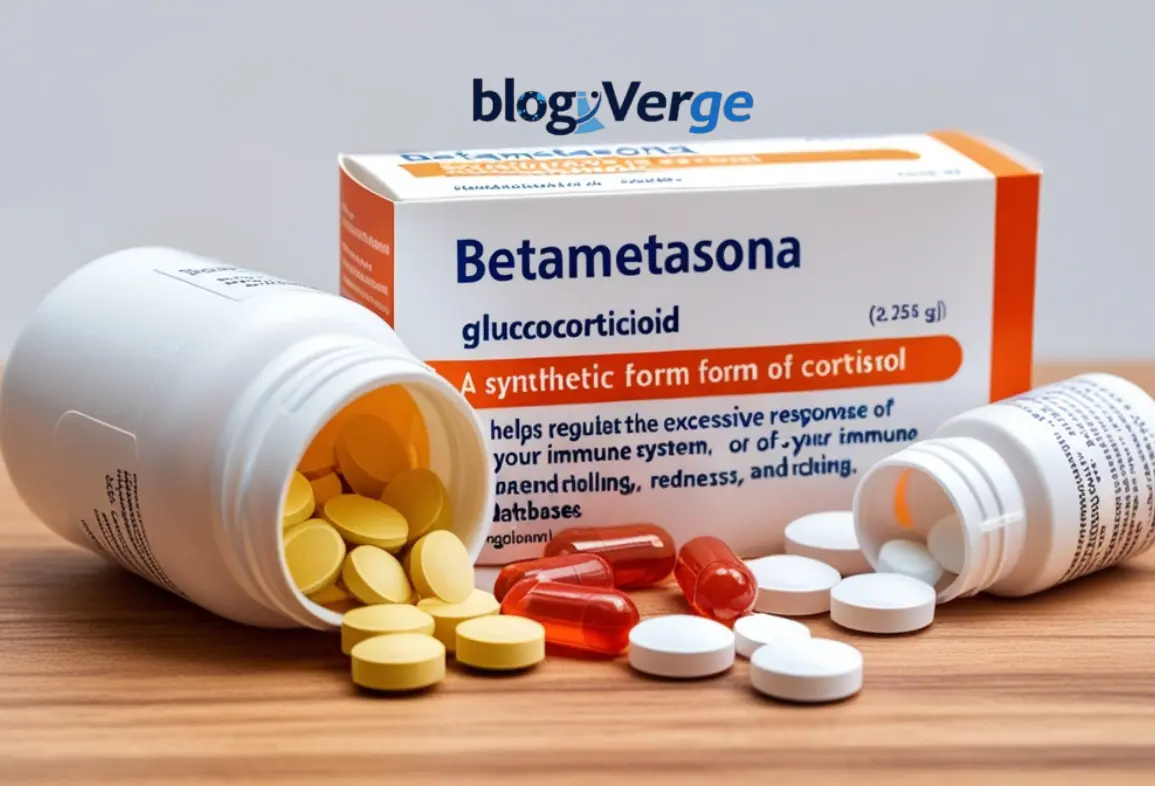The process of inflammation can be a real painkiller, whether it’s an itchy rash, sore joints, or a reduction in asthma; constant inflammation can significantly impact the quality of life. Physicians can choose among numerous treatments, yet corticosteroids are considered the most potent.
Betametacron is a name that turns up these days. It is yet unavailable to most households as a betamethasone or hydrocortisone bond, but in wellness blogs, physiotherapy facilities, and specific local regimen programs, it is gaining attention. This guide de-escalates Betametacron in plain language: what it is, how it functions, why people are talking about it, and how it is better than the alternatives.
Bottom line: Betametacron can be a powerful ally against stubborn inflammation. Handled carefully — with your doctor’s guidance — it may help you breathe easier, move more freely, and live more comfortably.
Table of Contents
Understanding Inflammation: The Basics
Consider inflammation to be your body’s alarm system. Your immune system invites your cells, enzymes, and blood flow to repair the damage when you cut your finger or get a nasty bug. Those traditional symptoms: redness, heat, swelling, and pain — are just typical symptoms of the repair process. Acute (or short-term) inflammation is generally considered a healthy response, and during the healing process, the inflammatory response typically subsides. However, when inflammation does not subside quickly (in cases such as arthritis, psoriasis, asthma, and autoimmune diseases), it becomes a problem, but not a vital defense. Here, a drug such as Betametacron steps in, subdues the overreaction, and lets your body rest.
Corticosteroids in a Nutshell
A brief history lesson clarifies the issue. During the 1930s and 1940s, researchers used to isolate cortisol, the body’s built-in anti-inflammatory hormone. Hydrocortisone entered the market, and by the 1950s, the hormone transformed the treatment of arthritis and skin diseases. Better versions, such as Betamethasone and dexamethasone, were developed in the decades that followed. Researchers continue to produce new formulations, and this evolution likely led to the creation of Betametacron, a corticosteroid type or brand similar to Betamethasone.
So, What Exactly Is Betametacron?
Betametasona is, in simple terms, a glucocorticoid, a synthetic form of cortisol. It helps regulate the excessive response of your immune system, which can result in swelling, redness, and itching. It is not yet flowing into world pharmacological databases, but it is regionally used and discussed for its benefits.
Betametacron vs. Other Corticosteroids
- Betametacron vs. Betamethasone: They are very much like each other in strength. Betamethasone already has a widespread presence throughout the globe; more likely, Betamethasone is an under-documented or regional counterpart.
- Betametacron vs. Hydrocortisone: Hydrocortisone is less inflammatory and is typically applied to children or to sensitive areas. Doctors usually prescribe Betametacron for more severe or chronic infections because it is more potent.
- Betametasona vs. Natural Options: People can use natural products such as turmeric, omega-3 fatty acids, and ginger to decrease mild inflammation; however, corticosteroids outperform anything in the natural world.
How Betametacron Works in Your Body
The thing is, though, that Betametacron does not just numb the symptoms, but rather it numbs the whole of it.
- Binding to Glucocorticoid Receptors: It enters the cells and suppresses pro-inflammatory genes while activating anti-inflammatory proteins.
- Blocking Chemical Messengers: It reduces the synthesis of the prostaglandins, cytokines, and histamines – compounds that cause swelling and itching.
- Constriction of Blood Vessels: It reduces erythema by narrowing some blood vessels in the inflamed tissue.
- Immune Regulation: It reduces the speed of attack by immune system cells on healthy tissue, thereby minimizing damage and pain associated with autoimmune diseases.

Where It’s Used
Corticosteroids are the Swiss Army knives of medicine, and Betametacron is not an exception. Doctors may prescribe it for:
1. Skin Problems Eczema & Dermatitis
- Reduces the erythema and itch quickly.
- Psoriasis: Delays the excessive turnover of cells to alleviate the effects of plaques and scaling.
- Insect Bites or Contact Reactions: Betametacron rapidly reduces the swelling and irritation.
2. Respiratory Conditions
- Asthma: Reduces inflammation in the airways, making breathing easier.
- COPD: Assists in reducing the ingress and wheezing during chronic asthma.
3. Autoimmune Diseases
- Rheumatoid Arthritis: Swelling and stiffness are also declining.
- Lupus or IBD: Reduces inflammation in the gut or organs.
4. Musculoskeletal Issues
- Tendinitis/Bursitis: Local inflammation – Bursitis is a localized treatment for tender flare-ups.
- Sports Injuries and Sciatica: Provides short-term procurement in the acute form.
5. Allergic Reactions
- Hay Fevers, Extreme Skin Dermatology: Decreases Congestion, Swelling, and itching.
How You Take It
Doctors will use different methods of delivering Betametacron depending on the condition.
- Topical creams, ointments, or lotions for skin problems.
- Oral tablets or capsules for system-wide inflammation.
- Injections into joints or muscles for quick relief during flare-ups.
- Inhalers (less common) target lung tissue directly.
Always follow your doctor’s instructions on dose and frequency. With steroids, more is not better — it’s riskier.

Benefits You Might Notice
Used correctly, Betametacron can bring fast, tangible relief:
- Reduces swelling, redness, and itching.
- Eases joint stiffness, helping you move more easily.
- Improves breathing in asthma or COPD.
- Lets you sleep better and function more comfortably during the day.
Risks and Side Effects
Betametacron has a downside just like any corticosteroid. Topical application is generally safe in the short term; however, complications may occur with systemic use or prolonged use by the patient.
Common but Mild: Brevitin stinging, dryness of skin, or change of mood.
Moderate: Gaining weight, fluid retention, or an increase in the level of blood sugar.
Serious (Long-Term): Hormonal imbalance (Cushing’s syndrome), osteoporosis, immunosuppression, and skin thinning.
Some of them, like pregnant women, children, people with diabetes, and individuals with uncontrollable infections, require special care.
How It Stacks Up Against Other Treatments
- NSAIDs (ibuprofen, aspirin): Great for mild pain but less potent for deep inflammation.
- Biologics (adalimumab, etanercept): Highly targeted but expensive and usually reserved for severe autoimmune cases.
- Lifestyle and Diet Changes: Crucial for long-term wellness but not a substitute for strong medications in severe conditions.
Pairing Betametacron with Lifestyle Habits
Medication works best alongside supportive habits:
- Eat an anti-inflammatory diet — think turmeric, fatty fish, leafy greens, and berries.
- Exercise regularly — such as swimming, yoga, or walking — to maintain joint flexibility and mobility.
- Manage stress — meditation or breathing exercises lower inflammatory hormones.
- Get enough sleep — your body heals and balances hormones overnight.
This combined approach can reduce flare-ups and even lower your steroid dose over time.

What Patients Say
What happens in life is a depiction of the same: a quick fix, but close supervision is necessary. Individuals with eczema or psoriasis often experience improvement in just a few days, while those with arthritis report loosened joints and reduced pain. Patients with asthma and COPD experience fewer flare-ups and breathe more easily. Some users have reported mild burning at application sites or when used orally, which has even caused bloating. The majority of them emphasize the need to adhere to prescribed doses and periodically have appointments with a physician.
The Road Ahead for Betametacron
The future of lower is research-intensive, as supported by Betametacron. Rigorous research, standard dosages, and novel formulations would propel it into the mainstream alongside the established corticosteroids. Future work involves developing superior topical gels, inhaled medications, and low-dosage oral medicines that would reduce side effects. If current research confirms its benefit, Betametacron will soon be more than just a new medication; it will also become a standard within anti-inflammatory therapy globally.
Conclusion
Betametasona is a medication that consists of a corticosteroid, but it approaches inflammation directly. However, since it is powerful, it should not be self-prescribed. And then, if you want to take Betametasona, you should discuss it properly with your medical team, take it, and integrate it with a healthy lifestyle. Such a moderate strategy offers benefits with the least risk.
FAQ
Q1: Is Betametacron stronger than hydrocortisone?
Ans: Yes, it's generally stronger.
Q2: Do you need a prescription?
Ans: Absolutely.
Q3: How fast does it work?
Ans: Topical use may help within hours; systemic effects often show in a day or two.
Q4: Can you use it daily?
Ans: Only under medical guidance.
Q5: Safe for facial skin?
Ans: Only if your doctor says so — the face is sensitive.


